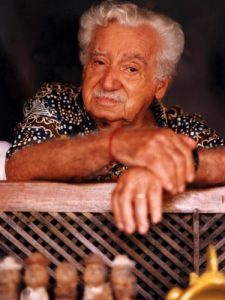Gabriela, Clove and Cinnamon – Jorge Amado – 1958

Ilhéus
Posted by Anna van Gelderen on 22/8/2004, 14:04:19
For those of you who are presently reading and enjoying the book of the month August (Gabriela, Cloves and Cinamon by Jorge Amado): it might be fun to check out the website of the city of Ilheus at http://www.ilheus.ba.gov.br/. Unfortunately, and as could be expected, it is in Portuguese, but at least you get a feel of what the place may have looked like in the 1920s and they even have a page dedicated to Jorge Amado.
We are going to Ilhéus
Posted by Lale on 7/9/2004, 13:17:20
I have past the half-way mark in the book and I don’t want to die before I see Ilhéus.
http://www.viagensmaneiras.com/viagens/ilheusING.htm
Gabriela, Clove and Cinnamon is a superb story. I am loving it. I can’t put it down. I will most definitely read Jorge Amado’s “Dona Flor and Her Two Husbands” at the earliest opportunity.
~
Jorge Amado

Posted by Lale on 7/9/2004, 13:20:28
Jorge Amado de Faria was born in 1912 in the city of Itabuna, district of Ferradas in Bahia. He moved to Ilheus at age 12,after his parents lost all the cocoa plantations they had due to floods. He studied law in the University of Rio de Janeiro.
Amado became the best known and most popular writer in Brazil. He wrote over 25 novels which were translated into 48 languages and stayed on bestseller lists in 52 countries. His novels portray life and customs in the Northeastern region of Brazil and deals largely with the poor urban black and mulatto communities of Bahia.
Amado died at the age of 88 years old on August 6, 2001.
(http://mostlyfiction.com/latin/amado.htm#bio)
~
Posted by Guillermo Maynez on 7/9/2004, 21:47:17
I also loved the book (it will be about time to discuss it right away, as soon as you finish it) and looked up the place on the net and it looks just beautiful. So, there will be a great ReadLit “summit” in Ilheus 2006.
~
Ilheus, here we come!
Posted by Lale on 8/9/2004, 8:47:34
We may see The Vesuvius Bar, Model Stationary Store and maybe even Gloria’s window 😉
We can sit in the market square and imagine how Gabriela, with her light feet, skipped on the stones.
We can look into the harbor and try to figure out where the sandbar was.
~
Posted by Lale on 9/9/2004, 11:31:30
At the time of the story (1925) women in Brazil could not vote, and divorce was illegal. Women earned the right to vote in 1933/34. Divorce became legal in 1977.
The following is an excerpt from: http://womenshistory.about.com/library/ency/blwh_brazil.htm
Encyclopedia of Women’s History – from Jone Johnson Lewis
For reasons of property transmission and religion, Brazilian society was originally strongly patriarchal, but there was also strong tension between rigid norms of Iberian origin and the extenuating circumstances of frontier life, where conditions were not favorable for compliance with the norms. The difficulty of putting Roman Catholic values into effective practice in the context of poverty, isolation, and unbalanced male/female sex ratios (number of men per 100 women) reinforced the Mediterranean double moral standard for men and women. Men were expected to demonstrate their masculinity, while proper women were supposed to remain virgins until marriage and to be faithful to their husbands. This double standard also favored frequent consensual unions, illegitimacy, and prostitution. Such behavior was not entirely acceptable but was tolerated more readily in Brazil, generally speaking, than in North America and the rest of Latin America.
Although women were allowed open access to schools and employment around the turn of the century and suffrage on a national level in 1933, they were not on an equal footing with men in family affairs. Men were automatically heads of households, and married women were legally subordinate to their husbands. Because of the inconvenience caused by informal remarriage, divorce was made legal in 1977. Under the constitution of 1988, women became entirely equal to men for all legal purposes.
~
Women’s Suffrage
Posted by Lale on 9/9/2004, 11:37:03
From http://www.ipu.org/wmn-e/suffrage.htm
(Notice Switzerland, 1971 – Lale)
A World Chronology of the Recognition of Women’s Rights to Vote and to Stand for Election
Unless otherwise indicated, the date signifies the year women were granted the right both to vote and to stand for election. The countries listed below currently have a Parliament or have had one at some point in their history.
1788 United States of America (to stand for election)
1893 New Zealand (to vote)
1902 Australia*
1906 Finland
1907 Norway (to stand for election)*
1913 Norway**
1915 Denmark, Iceland*
1917 Canada (to vote)*, Netherlands (to stand for election)
1918 Austria, Canada (to vote)*, Estonia, Georgia1, Germany, Hungary, Ireland*, Kyrgyzstan, Latvia, Lithuania, Poland, Russian Federation, United Kingdom*
1919 Belarus, Belgium (to vote)*, Luxembourg, Netherlands (to vote), New Zealand (to stand for election), Sweden*, Ukraine
1920 Albania, Canada (to stand for election)*, Czech Republic, Iceland**, Slovakia, United States of America (to vote)
1921 Armenia, Azerbaijan, Belgium (to stand for election)*, Georgia1, Sweden**
1924 Kazakhstan1, Mongolia, Saint Lucia, Tajikistan
1927 Turkmenistan
1928 Ireland**, United Kingdom**
1929 Ecuador*, Romania*
1930 South Africa (Whites), Turkey (to vote)
1931 Chile*, Portugal*, Spain, Sri Lanka
1932 Maldives, Thailand, Uruguay
1934 Brazil, Cuba, Portugal*, Turkey (to stand for election)
1935 Myanmar (to vote)
1937 Philippines
1938 Bolivia*, Uzbekistan
1939 El Salvador (to vote)
1941 Panama*
1942 Dominican Republic
1944 Bulgaria, France, Jamaica
1945 Croatia, Guyana (to stand for election), Indonesia, Italy, Japan1, Senegal, Slovenia, Togo
1946 Cameroon, D.P.R. of Korea, Djibouti (to vote), Guatemala, Liberia, Myanmar (to stand for election), Panama**, Romania**, The F.Y.R. of Macedonia, Trinidad and Tobago, Venezuela, Viet Nam, Yugoslavia
1947 Argentina, Japan1, Malta, Mexico (to vote), Pakistan, Singapore
1948 Belgium**, Israel, Niger, Republic of Korea, Seychelles, Suriname
1949 Bosnia and Herzegovina, Chile**, China, Costa Rica, Syrian Arab Republic (to vote)*
1950 Barbados, Canada (to vote)**, Haiti, India
1951 Antigua and Barbuda, Dominica, Grenada, Nepal, Saint Kitts and Nevis, Saint Vincent and the Grenadines
1952 Bolivia**, Côte d’Ivoire, Greece, Lebanon
1953 Bhutan, Guyana (to vote), Mexico (to stand for election), Syrian Arab Republic**
1954 Belize, Colombia, Ghana
1955 Cambodia, Eritrea2, Ethiopia, Honduras, Nicaragua, Peru
1956 Benin, Comoros, Egypt, Gabon, Mali, Mauritius, Somalia
1957 Malaysia, Zimbabwe (to vote)**
1958 Burkina Faso, Chad, Guinea, Lao P.D.R., Nigeria (South)
1959 Madagascar, San Marino (to vote), Tunisia, United Republic of Tanzania
1960 Canada (to stand for election)**, Cyprus, Gambia, Tonga
1961 Bahamas*, Burundi, El Salvador (to stand for election), Malawi, Mauritania, Paraguay, Rwanda, Sierra Leone
1962 Algeria, Australia**, Monaco, Uganda, Zambia
1963 Afghanistan, Congo, Equatorial Guinea, Fiji, Iran (Islamic Republic of), Kenya, Morocco, Papua New Guinea (to stand for election)
1964 Bahamas**, Libyan Arab Jamahiriya, Papua New Guinea (to vote), Sudan
1965 Bostwana, Lesotho
1967 Democratic Republic of the Congo (to vote), Ecuador**, Kiribati, Tuvalu, Yemen (D.P. R.)
1968 Nauru, Swaziland
1970 Andorra (to vote), Democratic Republic of the Congo (to stand for election), Yemen (Arab Republic)
1971 Switzerland
1972 Bangladesh
1973 Andorra (to stand for election), Bahrain3, San Marino (to stand for election)
1974 Jordan, Solomon Islands
1975 Angola, Cape Verde, Mozambique, Sao Tome and Principe, Vanuatu1
1976 Portugal**
1977 Guinea Bissau
1978 Nigeria (North), Republic of Moldova1, Zimbabwe (to stand for election)
1979 Marshall Islands, Micronesia (Fed. States), Palau
1980 Iraq, Vanuatu1
1984 Liechtenstein, South Africa (Coloureds + Indians)
1986 Central African Republic, Djibouti (to stand for election)
1989 Namibia
1990 Samoa
1993 Kazakhstan1, Republic of Moldova1
1994 South Africa (Blacks)

Posted by Rizwan on 9/9/2004, 13:08:20
By way of introduction: one could characterize this book as a treatise on the clash between tradition and modernization. But such a characterization would be incredibly boring–an affront to the memory and achievement of the great Jorge Amado. For what Amado has also done in this book is create nothing less than an erotic, exotic and undeniably beautiful work of art. And mirroring these sensual and desirable qualities is a character no less alluring. Mario Vargas Llosa once wrote of being “in love” with Emma Bovary; I confess to a similar passion for the divine Gabriela.
Of course, as you all have suggested in your recent postings, Gabriela is not without rival in her seductiveness. I don’t know what it’s like today, but 1920s Ilheus, at least as portrayed by Amado, is every bit the beauty that Gabriela is. And together, at least to me, they suggest and support all the (admittedly stereotypical) notions we’ve come to have about the country it all takes place in. Where else in the world does such joie de vivre, such zest for life as portrayed in this book, seem more at home than in Brazil? Is it even possible for this novel to have taken place elsewhere? I think not.
More on Amado’s art: I don’t think it is an overstatement to describe the characters in this book as almost Dickensian in nature. Perhaps the characters are not so conflicted and profound as some of Dickens’ best, but I, at least, have come to love and admire them just as much in spite of this…with Gabriela leading the way, of course. And part of this admiration is due to the fact that, unlike Dickens, whose characters remain “characters” to me, Gabriela is so real you can almost taste her. Is it any accident that Amado describes her as smelling of cloves so often?
I am loving Gabriela thus far, and I am loving visiting Ilheus in my imagination, with Amado as my guide, even more…so much so, in fact, that I fear the trip to Ilheus that’s been proposed might be a huge disappointment. For what reality could possibly measure up to the immaculate imagery I suspect has been conjured up in all of us after reading this wonderful novel?
~
Posted by Lale on 9/9/2004, 17:39:58
I loved this book. For my usual pace, I read it very quickly, in less than 10 days.
It was like the Gabriel Garcia Marquez stories I love so much.
These are some of the things I hope we can talk about:
– Hypocricy.
– Double standards for men and women. Then, even more double standards for women of different marital status.
– Cleaning up the honour by murder.
– In Nacib’s case, cleaning up honour by annuling the marriage (backwards and forwards).
– Flowers that tilt when you put them in vases.
– The old, very tacky saying: “If you love something set it free. If it comes back …”
– Did nature intend for homo sapiens to be monogamous?
– A circle of friends. They play backgammon. They eat, drink, chat. One of them also orders the killing of another man. The attitude towards the political violence. Amancio Leal’s continued place in the social circle, and later on, complete redemption.
Etc.

Review of Stephen
Posted by Lale on 9/9/2004, 17:48:04
Boosterism in Brazil
North American writers have poured forth a plentitude of books on the ‘Twenties. From that era of tumultuous fortune-making, Prohibition and “boosterism”, many tales and no end of scathing criticism have been derived. “Boosterism” was the phrase applied by businessmen touting their communities as forward looking, progressive, expanding. Government at all levels, in their eyes, existed solely for the purpose of providing what is now called “infrastructure” to assist in “development”. Underlying this promotional attitude were the hidden lives of the people. Jorge Amado demonstrates that the phenomenon wasn’t restricted to the North. In this bizarre novel of a Brazilian community, he portrays the clash of tradition and “progress” in a different environment.
Gabriela, a migrant worker, arrives in Ilheus. A town braced by the sea and extensive cacao plantations, it was founded in violence and is sustained by fear. The skirmishes that created the plantations left an oligarchy of “colonels” dominating the society and politics of the region. Honour is the rule, backed by a tradition extending back to Iberian aristocrats. Allegiances are fixed and endure long. Challenges to the Establishment are met with swift, violent response. Gabriela, originally a distant viewer of these clashes, is ultimately and intimately drawn into them. Amado’s picture of this rigid social milieu and how it effects the innocent, demonstrates the power of money and character against tradition. The conclusion is anything but foregone, as he depicts the plots, subterfuge and ferment resulting from the jousting contenders.
The challenger is Mundinho Falcaho, young, ambitious and full of fight. He deplores the favouritism government shows to other communities. He wants “progress” and improvements for Ilheus. The pivotal element couldn’t be more mundane – a sandbar in the harbour blocks the entry of ocean-going ships. Around this issue, Amado builds a story of intrigue, power manipulation and, amazingly, fierce and tender romance. In this stark tale, the characters are flexible and learn to adapt. The “Turk”, a Syrian-born bar owner, learns how to evade the code imposed on betrayed husbands. The humour, and this story is lightly told, is muted – as is the tragedy. There’s little to laugh at, here, but no tears should flow.
Amado, once a Nobel nominee, would appear dated today. That shouldn’t detract from the power of his prose. His portrayal of women would bring down scorn from a segment of today’s society, but he is depicting a distant time and place. Such criticisms should be curtailed unless you’ve lived that life. He was a keen observer of humanity, exposing strengths and frailties with equal skill.
(Posted at Amazon on August 29, 2004 – Stephen A. Haines)

Posted by Lale on 9/9/2004, 18:22:18
Here are some excerpts from Gabriela that I have found humorously (or satirically) illustrative of some of the themes in the book:
At every table in Nacib’s bar, men were discussing the crime. They all approved the planter’s action. Not one voice was raised, even among the women in the church vestibule, in defence of poor, beautiful Sinhazinha. Colonel Jesuino had proved himself a real man, resolute, brave, honorable, as he had done so often during the period of struggle. People remembered that the colonel and his hired assassins had been responsible for many crosses in the cemeteries and at roadsides. He had not only engaged the assassins but had led them himself on certain famous occasions … He was a fearless and stubborn man. (Pg. 123)
~
“It’s just that the time is over when a man could come here with nothing but guts and a gun and take some land and plant cacao,” said the oarsman. “Those were the good days. All you had to do was get rid of four or five others who wanted the same land, and you were rich.” (Pg. 161)
~
[In reference to how things have changed.]
“You can’t even fire a few shots in the street. They want to arrest you right away.” (Pg. 162)
~
… The Captain introduced [the teenage girls] to the engineer.
“Our studious youth — future mothers and housewives: Iracema, Heloisa, Zuleika, Malvina …” (Pg. 218)
~
“Whatever you wish. Poetry is not something one sells. If I didn’t have to pay for paper, printing, and binding, I would distribute my books free, by the handfuls, as the poet within bids me do. But — who can escape the base materialism of life? This volume, which contains all my latest and finest poems, acclaimed throughout the country from north to south and enthusiastically received by the critics in Portugal, had to be published at my own expense, and it was an expense beyond my poor means. To be utterly frank with you, sir, I have not yet been able to pay the bills. the price is whatever you wish it to be, my dear friend.” (Pg. 333)
~
“Why the devil did they have to go and kill people on the day when they were giving me a dinner? Couldn’t they have picked some other time?” (Pg. 375)
@
Postscript
Posted by Lale on 10/9/2004, 10:15:06
“Some time afterwards, Colonel Jesuino Mendonça stood before a jury, accused of having shot to death his wife, Sinhazinha Guedes Mendonça, and the dental surgeon, Osmunda Pimental, for reasons of jealousy. The lawyers talked, all in all, for twenty-eight hours. Dr. Mauricio Caires quoted the Bible and referred to scandalous black stockings, morality, and depravity. Dr. Ezequiel Prado said that Ilhéus was no longer a land of bandits, a paradise of assassins; his theme was civilization and progress. With a sob he pointed to Osmundo’s father and mother, in mourning and tears. For the first time in the history of Ilhéus, a cacao colonel found himself sentenced to prison for having murdered his adulterous wife and her lover.”
@
Posted by moana on 10/9/2004, 17:59:35
I loved this book. I loved the characters, I loved the imagery, I loved the ending. Five hearts, no question. Every word of description was perfect, so much that I ached with Nacib’s jealousy and felt desolate and lonely when Gloria leaned all afternoon out of her window.
What character did people sympathize with the most?
~
Posted by Lale on 10/9/2004, 19:23:57
: What character did people sympathize with the most?
I liked the characters of Felipe and Joao (I forgot the rest of his name) the best.
The characters were realistic. No character was “perfect”. I liked Nacib and Gabriela. At times they both did things that I did not approve of (perhaps because I am a being of these times and not Brazil of 1925) but still I liked them.
I knew immediately that Gabriela couldn’t be and shouldn’t be contained. But Nacib had to learn this the hard way. He was not a philosopher like Felipe or Joao who saw right away that Gabriela was a wild flower, not to be put in a vase.
I liked the Doctor with his endless Ofenisia stories.
I liked Dona Arminda who always offered her help.
And Tuisca…
I really enjoyed the political and social struggles, how business was done back then. It reminded me of some of the goings on in Turkey.
There were some facets of humans that I did not know about before. For instance, an otherwise “good man” like Felundo can easily shoot at men for money, kill people who had done nothing wrong to him. That was his job. But he couldn’t kill women. He carried a sick man on his back. These things were incomprehensible to me and yet they exist.
~
Posted by Guillermo Maynez on 11/9/2004, 13:41:06
I am so glad that you people also detected what I found to be the main subject of this book: what happens to social mores and habits when progress storms into a community. Beneath a love story, “Gabriela…” is about change, social and moral change.
As I understand, I am the only memeber of ReadLit who currently lives in a Third World, backwards society, and so this book sent me a lot of messages, without taking, of course, antyhing from the pure literary enjoyment of this exotic and erotic (as Rizwan said) piece of storytelling.
Contrary to most people, Gabriela wasn’t the character which I liked the most (although I would have loved to…well, you get it). There are a very wide host of characters whom I would have loved to meet, starting with Nacib himself. Man, I am eager to taste the sweeties and salties in that very bar, accopmanied by a “caipirinha”, watching the blue sky and the dark sea of Brazil. The man who owned the bookstore, Juan Fulgencio, is another character that I liked very much, especially when he encouraged Malvina Tavares to follow her intellectual and professional ambitions and get out of her father’s oppression (now that’s another girl which I could have.. etc.). I also liked the practical way in which Fulgencio, a true friend, resolved Nacib’s predicament when he found out about Gabriela’s infidelities. For me, Fulgencio was the most attractive character, even if he wasn’t one of the main ones.
Mundinho Falcao was not particularly sympathetic, but he represents civilization and progress. He deserved to win, with the help of the mayor of Itarabuna, the neighboring city, the guy who was shot by the black Fagundes.
Sonia was a very erotic character, always leaning on her window and hoping for somebody to satisfy her sexual nature.
Colonel Ramiro Bastos represents the Ancien Regime, and it is very very hard to make a moral judgment about him. Of course, he is a violent, dictatorial strongman, a murderer and a corrput politician. But hey, those were hard times and he was the man who first brought entreprise to Ilheus. Now his time has come in the shape of Mundinho Falcao, and change must be brought about.
I have many things more to say about this book, and I will do so in subsequent contributions, but let me finish on a personal note: last February 10th, on the day of his 69th birthday, my father died. Ilhéus is very different in geography and setting from the town in the wild west where I grew up, Torreon. But throughout the book I couldn’t help remembering the old cafés where my father and other businessmen would get together to talk about business, gossip, and have a few drinks before lunch. The hot sun, the delicate sound of ventilators on the roof, the quiet gossip, all that got into my memories as I also remembered the sweet smell of a cold beer, as I was a five year old standing by my dad and listening to how old X had found her wife with Y. Lovely book.
~
Posted by the bunyip on 12/9/2004, 9:18:44
G’day, All,
Reading this book almost in parallel with de Bernieres’ “trilogy” on the Columbia of the 1990s has been a bit of a jolt.
The shift in countries is minimal [there are more mountains in Columbia – at least in terms of the novels], but the real shock is to see how little has actually changed over almost three generations. The priest has six children, while the cardinal has but one. The attitude about women hasn’t changed a whit, although the motive for murdering them is less passion and more politics. There is, of course, an intellectual hero with ambitions for reform. “Reform”, mind you, remains a term of loose definition. The 70 year climb between the two books is a slope on a par with the Simpson Desert in Australia – next to nil.
De Bernieres is a “must read” – not just for a kinked view of the life and times, but for his capacity to impart reality in an imaginative framework.
the bunyip
~
Posted by Anna van Gelderen on 14/9/2004, 12:55:25
Gabriela is interesting.
Her moral outlook is stunningly simple and extends no further than “Always help your friends” and “Try not to hurt them”, yet she is also some kind of example. She is a marvellous animal and by that I don’t mean anything derogatory. For she never wants more than she needs, she is always generous, she is never envious, she doesn’t care for status, she lives for the moment and is able to be perfectly happy with small things like a beautiful flower or a sunset. Unlike most of us, it never occurs to her to regret what she doesn’t have. Instead she makes the most of what she has. To us that may seem little, because we always want more, but to her it is bliss. To be able to live like that is pure levenskunst, as we in the Netherlands call it: the art of living.
To be honest, I sometimes thought she was a bit too good to be true, but then, I am sure that is just envy and my bad character.
~
Posted by Lale on 14/9/2004, 13:47:13
I think people like Gabriela, or at least their sub-species, exist. I know two people who exhibit Gabriela-like traits (as Anna has summarized in her note) and seem to be in in perfect harmony with themselves and with life. But, the rest of the society rarely wants to or is able to accomodate Gabrielas of the world. Just like Nacib, well meaning loved-ones may try to make Gabrielas wear shoes or attend poetry readings. This difference in the view of what “a good life” consists of causes some grief to the loved ones, and ultimately, to the Gabrielas.
One of the two Gabriela-like people I know (a woman) is pretty much accomodated by her family and friends. She is accepted as she is. The other one (a man) is dealing with day-to-day frictions. His employer, his wife, his parents and even his friends (me) don’t want him to be content with what he is and what he has.
Remember the scene from “The Outsider”: Mersault is offered a better position by his boss. “Better” because, this new position is in Paris. Plus Mersault would be able to travel around, see new things. But, to the dismay of his boss, Mersault is not interested. He doesn’t want to live in Paris and he doesn’t want to travel around. He doesn’t want to get ahead, make more money, climb up the ladder. He is simply happy where he is at. This is incomprehensible to his boss (and unfortunately to many of the readers as well, if you look at the reviews at amazon).
Does the world treat the male Gabrielas less kindly than the female Gabrielas?
Lale

Posted by Mauricio Oliveira – added in 2006
Hello. I am a Brazilian guy from Ilheus, hometown of our most famous writer, Jorge Amado. For over 5 years I worked as a certified tour guide in my hometown before moving to the Los Angeles in the US. I read in the forum for the book “Gabriela, Clove and Cinammon” that there would be a readLit sumit in Ilheus in 2006. Do you guys know anything about it?
I’d love to participate, and who knows, show everybody my beautiful city.
Thank you kindly,
Mauricio Oliveira
~
Posted by Lale – added in 2006
Dear Mauricio,
We are delighted to receive your email.
Yes, indeed, we read the book, we loved it and we all dreamed about having a book club meeting in Ilheus. It would be wonderful. I even marked it in my Atlas and wrote beside Ilheus “Sep. 5th, 04”, to see how many years it would take me to finally make my dream come true. We all would love to go. Our book club members are from Canada, US, Mexico etc. It is not that hard to organize this trip. Who knows, maybe it will happen, now that we even have a local, in fact a real tour-guide to show us around. 🙂
I posted your letter on our “Talk Literature” page. I will post mine (this one) as well. Come and talk with us over there. (When you go to ReadLiterature.Com, look at the top left corner, you’ll see Talk Literature.) You can tell us about some of the things in the book: The Vesuvius Bar, Model Stationary Store and the sandbar … Are they real?
~
Posted by Mauricio Oliveira on 4/1/2006, 18:53:28
Hello Lale,
It was great to receive your email too.
It is so rewarding to me to know that people from all over the world know about my hometown. Ilhéus is an amazing city and especially for those who have read Jorge Amados’ literature, walking thorough the streets and alleys of Ilhéus is like a walk in history.
The Bar Vesuvio is still there. After years of fights between the heirs ( Nacib’s descendants) and partners, it was recently renovated and still serves the best beer and quibes in town. There is also a small stage inside and small plays, with locals dressed as Nacib, Gabriela and even Gloria being sneaky and gossiping at the windows. Believe me, Ilhéus is still full of Glorias…
The families are still there, now poor after a disease attacked the cocoa plantation in the early 80’s. Still snobby though they just don’t want to wake up and smell the coffee (or the chocolate) only because their family names were mentioned in a novel.
There are many Model Stationary Stores in Ilhéus, so it’s hard to think of which Jorge was referring to … and, about the sandbar, I will keep that and many other things to myself, so that you can end up going to Ilhéus.
~
Posted by Lale on 5/1/2006, 9:44:38
Dear Mauricio,
This is so amazing, it is like talking to a character from a book.
: The Bar Vesuvio is still there. After years of fights
: between the heirs ( Nacib’s descendants) and partners,
: it was recently renovated and still serves the best
: beer and quibes in town.
I would love to have a drink there. I didn’t think all the characters and stories in the book were this real.
: There are many Model Stationary Stores in Ilhéus, so
: it’s hard to think of which Jorge was referring
What does “Model Stationary” mean anyway, I always wondered about that. Is it a stationary store that is exemplary (as in a “model student/exemplary student”) or is it a store that sells model airplane, ship, architecture kits and supplies?
: about the sandbar, I will keep that and many
: other things to myself, so that you can end up going
: to Ilhéus.
OK. Deal. I think after this we will take it more seriously to go there. Weather-wise, what would be the best time to visit Ilheus? Hotels, decent ones, like 3, 4 star ones, are they expensive?
I imagine the food to be exquisite. I think we would be doing a lot of eating and drinking. It would be lovely. After daily tours, we would be gathering at Bar Vesuvio…
Mauricio, we read another book from Brazil: “The War Of The End Of The World” by Mario Vargas Llose, it is the story of Canudos.
~
Posted by Mauricio Oliveira on 16/1/2006, 17:18:36
Hello everyone,
I am glad to see that Ilheus’ thread is going far. I apologize (especially to Lale) that I took so long to reply. Well, the life of an Ilheense (someone born in Ilheus) is no fun when after he moves to Los Angeles. I currently work ( a lot) for the support department of Withoutabox.com, a submission system for screenwriters and independent filmmakers. (http://www.withoutabox.com)
Lale, in response to your question: What does “Model Stationary” mean anyway, I always wondered about that. Is it a stationary store that is exemplary (as in a “model student/exemplary student”) or is it a store that sells model airplane, ship, architecture kits and supplies?
“Model Stationary” is probably the best word that the translators found to replace the word “Livraria Modelo”, in Portuguese. Livrarias Modelo, nowadays only called “ivrarias” are simply an office supply store, where they also sell books for schools and colleges/universities.
Each educational institution have their own list of books they need the students to buy, and each of them will suggest their own “Livraria Modelo”. Those commercial establishments became also a “hang out” place for people with spare time in their hands, friends and relatives of the owner or employees that came to gossip the whole afternoon. Up to this day, if you want to know the latest gossip in Ilheus, DO NOT go online, instead, go to the office supply store… Funny huh? Somehow they will mange to get books from the shelves or make copies of documents without stopping the gossip.
Remember, time is NOT money in Ilheus anymore after the cocoa plantations are almost gone.
People, Ilheus has so much to see. I was born and raised there, but still, walking through its streets is like literally being inside a book. Reading Amado’s description of the Ilheenses is like reading my own biography. I’d LOVE to show all that to you guys.
Mauricio Oliveira
~
Special thanks to Mauricio Oliveira















